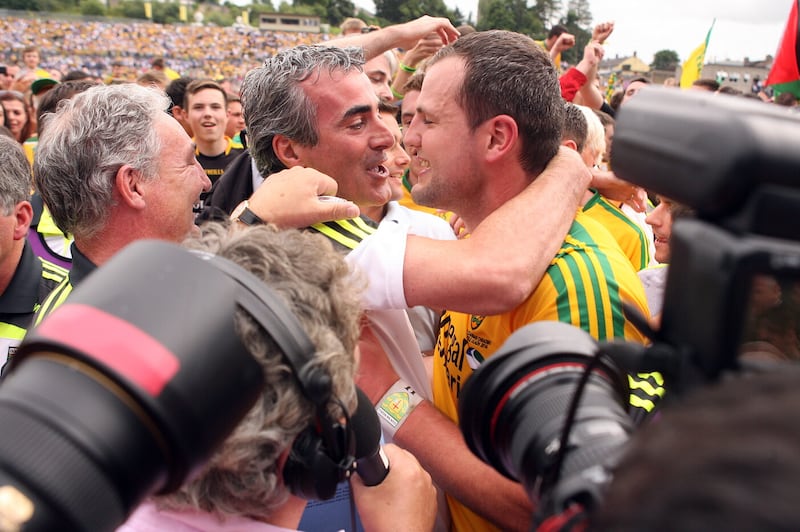Donegal great Michael Murphy reckons Jim McGuinness will ‘absolutely love’ the prospect of getting stuck into Gaelic football’s new rules.
Murphy, who captained Donegal to All-Ireland success in 2012 under McGuinness, is part of the 12-man Football Review Committee that presented its interim report on Thursday.
Contained in the 204-page document is over 50 different motions that relate to their proposed ‘rule enhancements’ which will be on show in next weekend’s interprovincial competition at Croke Park.
The FRC has placed an emphasis on seven core enhancements, the most notable of which is the rule that at least three players must be kept in the opposition’s half at all times.
McGuinness, currently in his second spell managing Ulster champions Donegal, shot to prominence initially as a manager who embraced and refined the blanket defence strategy, using it to land the All-Ireland with Murphy as skipper.
Asked how McGuinness, who has since coached extensively in professional soccer, will feel about the new changes which are principally designed to cut down on congestion around the field and to speed up the game, Murphy suggested the Glenties man will love them.
“That’s an interesting one, the automatic answer that comes to me right away is that I’d say he’ll absolutely love it,” said Murphy.

“Yeah, he’ll absolutely love it. I think he’ll love coming up with ways to figure and to try and coach the team. It was very interesting to see just how good they were set up attacking-wise this year.
“I thought what he did with them was really good for his first year with the team. I would imagine he’ll look at it and he’ll see potential (in the new rules). I would say he will, and I’d say all managers will, they’re bound to.
“You have to be at a stage where people are thinking like that. No doubt the teams that have been successful this year, they’ll look at it and think, ‘we were successful, we’ll keep the blueprint as it is’.
“But I’m sure most others will be thinking, from a coaching point of view, how can I get three up?
“What can we do with the long kick-out? What can we do if we maybe have four up? How can we press against them?
“You would have to feel that for the innovative, energetic coaches and players out there, they’ll be looking forward to getting on with it.”
Murphy stressed that there is no guarantee any of the rules will definitely come in. They still have to get the go ahead from Central Council on October 26 and, after that, make it through a November 30 Special Congress.
But the Glenswilly man, who quit Donegal two years ago, is hopeful that change is coming.
“When I was playing myself and different rules or structures were brought in, I remember I’d be thinking, ‘no, no, no, no, no’,” he said.
“It was no to everything. But as a player you’re so in the Monday, Tuesday, Wednesday, Thursday mindset.
“All you’re trying to control is your next session, your next week’s training.
“But it was really great to see that people do want to do something. I think it’s just come to a crux where they do feel that there’s a change needed, just for the enjoyability aspect of watching the game.”

Murphy was speaking in Croke Park where, back in 2011, he was part of a Donegal side that unashamedly parked the bus and got everyone back behind the ball in a famous All-Ireland semi-final against Dublin.
Now, 13 years on, he is one of those leading the charge to eliminate those sort of tactics from the game.
Murphy acknowledged that, in 2011, Donegal’s first season under McGuinness, they only had ‘one real part of our game developed’ and that, ‘we didn’t have the midfield play or the attacking play really developed at all’.
But he said that it was a different story in 2012 when they won the All-Ireland and looked back fondly on how Donegal set themselves up that season.
“People say that, ‘Yeah, you invented it’,” said Murphy of blanket defending and counter attacking.
“I still think of Karl Lacey and Frank McGlynn, of their quick transition up the pitch. I think of Neil Gallagher’s display in the middle of the field, catching kick-outs in the (2012) semi-final, I think of Colm McFadden’s performance as an inside forward that year.
“I know we’ll get tarred and labelled as that defensive team that brought in defensive football. But I remember the high fielding in the middle of the field, Neil McGee’s one-on-one defending, Karl Lacey and Frank McGlynn transitioning.
“Mark McHugh’s ability to transition. And I’ll say to myself that’ll stand up to any of the eras and those particular skill sets.”



